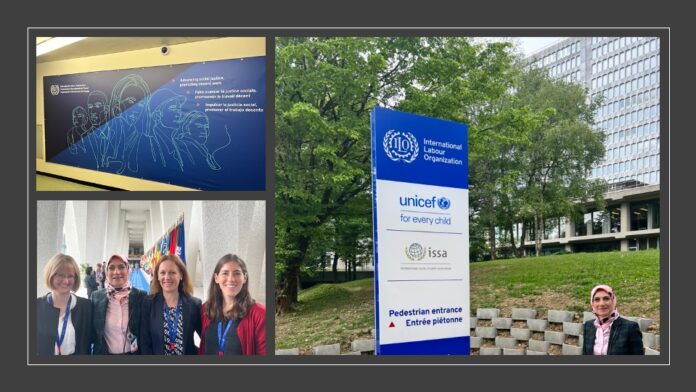As part of the engagement and dissemination activities for the Retention and Sustainability of Social Care Workforce RESSCW project, Professor Shereen Hussein was invited to share some of the findings at the International Labour Organisation (ILO), Geneva, in 2022. This project is funded by the Health Foundation and is a collaboration between the London School of Hygiene & Tropical Medicine, the University of Kent, UCL and Skills for Care.
A workstream of this project was dedicated to investigating the impact of COVID-19 on the UK’s Long-Term Care (LTC) workforce. It involved several rounds of surveys complemented by key stakeholders’ interviews. Some findings highlighted the massive increase in workload and working hours and significant increases in unpaid sick leave among the workforce. However, one of the striking findings of the surveys was a substantial increase in the level of abuse faced by the workforce, especially during 2021. Workers from minority ethnic groups and those working in care homes were particularly at higher risk of incidences of abuse. The abuse was perpetuated by service users, their families, managers, co-workers and even the public. Some of the survey analyses were published in this article.
RESSCW-C19-ILOThe findings of this strand of work are of particular interest to the ILO as they have had extensive work promoting decent working conditions for LTC workers. For example, a recent ILO report notes how the demand for LTC provision is escalating worldwide; however, ‘it is characterized by a range of decent work deficits, largely attributable to gender-biased undervaluation and discriminatory factors‘. The report provides essential recommendations related to the training and well-being of LTC workers. These developments are crucial for countries in the MENA region as they start developing their LTC markets. Another aspect of the LTC workforce relates to the reliance on migrant workers, especially women. This is happening in both more developed countries as well as in the Middle East. Such demand, accompanied by unregulated and fragmented LTC markets, increases the risk of exploitation of workers and those receiving care, a topic discussed in further detail in this article.
In a previous Policy Brief, the ILO had developed vital messages to achieve decent working time for nursing personnel, including LTC workers, which is directly linked to their well-being. The RESSCW findings highlight that workers’ well-being was highly compromised due to the COVID-19 pandemic. Policy interventions should be implemented to mitigate this effect and ensure a sustainable LTC workforce. The ILO has developed several standards to ensure the quality of work and the well-being of LTC workers, including when violence and harassment are involved.
As we move into the post-COVID recovery phase globally, governments and care providers need to consider the sustainability of the LTC workforce. ILO has been doing important work in this area. In this video, Maren Hopfe, Technical officer at the ILO, highlights the particular vulnerability of LTC workers during COVID-19, which the RESSCW study has highlighted.
Founder and Director
Shereen Hussein is a Health and Social Care Policy professor at the London School of Hygiene and Tropical Medicine (LSHTM), United Kingdom.
Shereen Founded the MENARAH Network in 2019, through an initial grant from the Global Challenge Research Fund, UKRI. She is a medical demographer with expertise in ageing, family dynamics, migration and long-term care systems. Shereen regularly collaborates with the United Nations, the World Health Organisation and the World Bank in policy and research focused on ageing in the Middle East and North Africa Region.
Shereen received her undergraduate degree in statistics and a postgraduate degree in computer science at Cairo University. She completed an MSc in medical demography at the London School of Hygiene and a PhD in quantitative demography and population studies at the London School of Economics and Political Science, United Kingdom.



